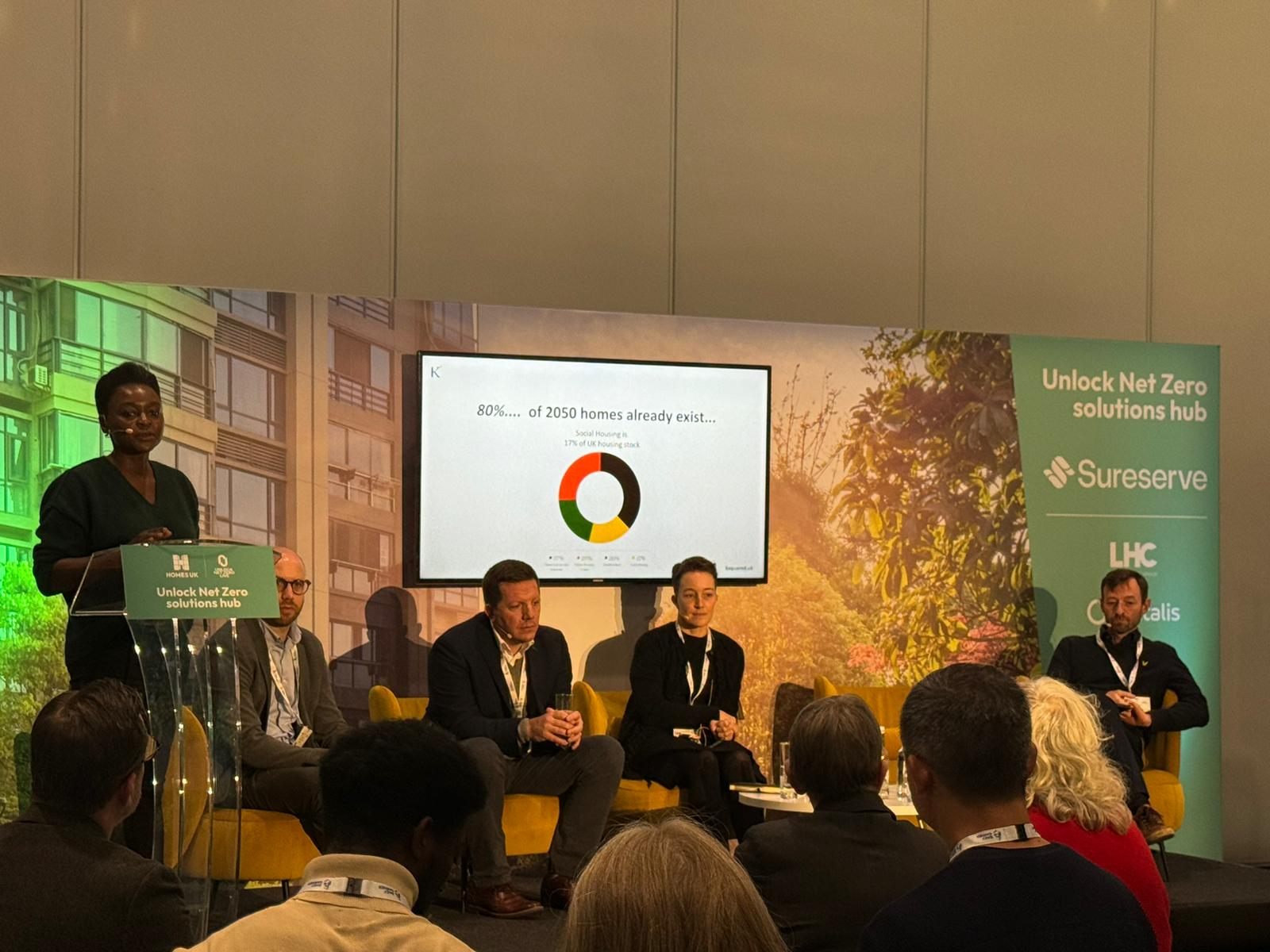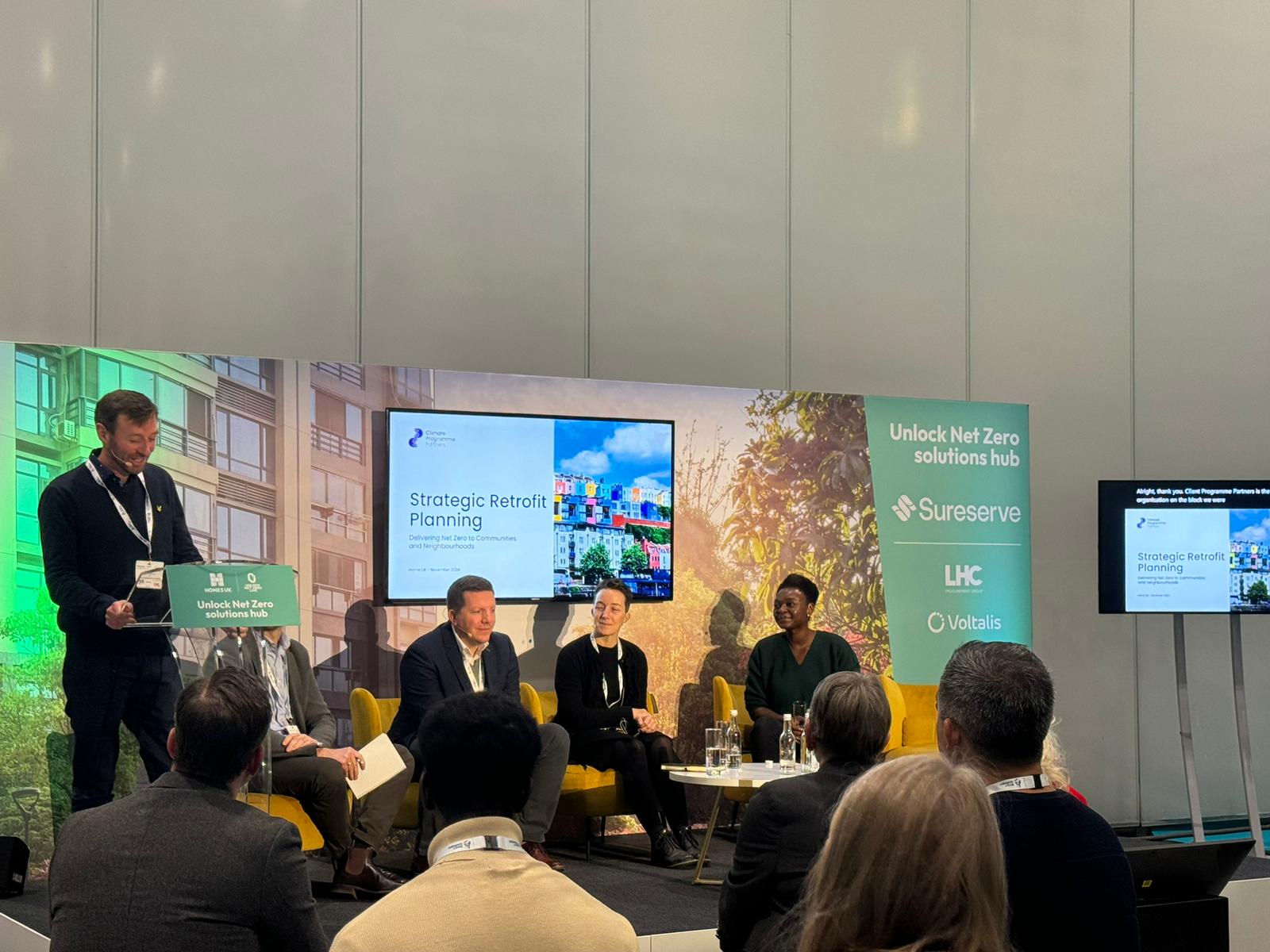News
Strategic Retrofit Planning – Delivering Net Zero to Communities and Neighbourhoods
Strategic Retrofit Planning – Delivering Net Zero to Communities and Neighbourhoods
This is a summary of the panel presentation given at Homes UK Unlock Net Zero Solutions Hub on Thursday 28th November 2024.
The Panel of Speakers
The panel consisted of Andrew Tod, Head of Net Zero Carbon at Susreserve as Chair, Kasang Kajang, Founding Director at Ksquared, Andrew Piper, Head of Sustainability at Vivid Housing, Cat Magill, Partner/Co-founder at Living Places and Jamie Abbott, Director at Climate Programme Partners.
Andrew started us off by emphasising that we won’t hit our net zero and EPC targets, nor bring people out of fuel poverty, if we’re only retrofitting homes on a house-by-house basis. We need to be acting on a street-by-street and community scale. He introduced the panellists who are all passionate about making retrofit at scale a reality, brining together multiple stakeholders to deliver better projects.
Tackling the Challenges of Retrofitting
Andrew Piper, Head of Sustainability at Vivid Housing, opened the panel with remarks on the challenges of retrofitting one million homes annually. He highlighted issues such as a lack of strategic coordination, limited capacity within local authorities, and missed opportunities to include fuel-poor households adjacent to social housing projects.
Despite these challenges, he emphasised that housing association investments and new grant programs present opportunities to adopt a cross-tenure approach, foster collaboration with local authorities, and retrofit entire communities. Such efforts could reduce costs, develop skills, expand supply chains, and create more cohesive, energy-efficient housing.

Navigating Challenges and Opportunities in Local Net-Zero Transitions
Cat Magill, Partner/Co-founder at Living Places, followed by discussing key challenges such as navigating financial responsibilities despite available grants, integrating public and private financing, and designing holistic solutions that balance decarbonisation, energy affordability, and community wellbeing.
She emphasised that a collective approach involving neighborhood-wide retrofitting, comprehensive planning, and coordinated communication can reduce costs, enhance public trust, and provide additional benefits like green spaces and EV charging. Tailored solutions, supported by existing programs and community groups, can create scalable, repeatable models for just, local net-zero transitions, delivering healthier, happier homes and neighbourhoods with long-term social, economic, and environmental value.

Putting People First: A Holistic Approach to Retrofitting
Kasang Kajang, Founding Director at Ksquared, opened her presentation by highlighting the importance a holistic, people-first approach to retrofitting, particularly for smaller housing associations, which collectively manage around 17% of UK’s social housing stock.
Kasang advocated for collaboration on retrofit projects through consortia to streamline funding and resources, ensuring retrofits prioritise residents’ needs and timelines to enhance engagement. She highlighted the importance on focusing on people first - acknowledging that it is the residents’ home and retrofit solutions need to work for them. Kasang also highlighted the financial challenges smaller associations face, proposing strategic partnerships and funding models to make projects viable and scalable, fostering warmer, more sustainable homes with strong resident involvement.

Driving Growth and Cohesion in Retrofit Delivery
Jamie Abbott, Director at Climate Programme Partners, opened his presentation by discussing the rapid growth of retrofit activities, particularly through the delivery of funding Social Housing Decarbonisation Fund (SHDF) waves 1 and 2.1. He highlighted the challenges associated with scaling teams and identifying future opportunities as funding cycles come to a close.
Abbott emphasised the need for efficient, inclusive, and cohesive delivery, focusing on place-based approaches that invest in communities, build skills, and reduce costs. He also called for improved coordination across funding schemes, strategic partnerships, and stakeholder mapping to align efforts among social landlords.
With significant funding and political commitment flowing into the sector, Abbott stressed the importance of new delivery models that prioritise social cohesion, streamlined logistics, and supportive governance to achieve better outcomes for neighbourhoods.

Question Time
Most Homes That Need Retrofitting or Improvement Are Privately Owned, But They Lack The Funding Available to Social Housing. How Does This Fit into Existing Schemes?
Cat highlights that retrofitting should be accessible to all, but many private homeowners are "stuck in the middle"—fuel poor yet unable to access funding. The "able to pay" market is small, and upfront costs remain a barrier despite potential energy savings offsetting expenses.
Kasang notes that while schemes like ECO4 and Warm Homes assess affordability, they fall short for private homeowners struggling with rising living costs. Current grants focus on fuel-poor households, leaving limited options for the private sector.
Jamie points out that grants like Warm Homes target social housing and fuel-poor households, but there’s a gap for those willing but unable to pay upfront for retrofitting.
Andrew emphasises funding gaps in retrofit programs for private properties and stresses the need for better collaboration between landlords and tenants to address retrofitting challenges in the rental sector.
Together, these perspectives call for inclusive funding models to close gaps across fuel-poor households and unsupported private homeowners.
Andrew continues the discussion asking the panel:
What Will be the Next Steps of no Upfront Cost Retrofit?
Jamie emphasises the need for collaboration, a model that shares savings between social landlords, funders, and residents. This approach would reduces residents' fuel bills and utilise lower tariffs and generated clean energy to create a flow of funds supporting future retrofit programs.
Cat emphasises the importance of demonstrating retrofit's value by showcasing programs where savings exceed costs. Reducing energy demand is critical, but fabric upgrades are expensive, requiring innovative funding models. Clear narratives and urgency are needed to drive the necessary changes swiftly.
Together, these insights stress the need for practical demonstrations and collaborative funding models to make no upfront cost retrofits viable and scalable.
Recent Reports Highlight Issues With Previous Insulation Schemes: How Can New Retrofit Schemes Ensure Long-Term Confidence Among Participants, Avoiding Past Mistakes And Offering Robust Solutions That Protect Both Homeowners And Their Investments?
The panel emphasised the need for quality oversight in retrofit programs, particularly in grant-funded social housing, with clear milestones to ensure proper control. They endorsed PAS 2035 (Publicly Available Standard) as a key standard for compliance and addressing delivery risk, and stressed the importance of detailed specifications carried out by accredited installers who provide warranties. Independent quality assurance was highlighted as essential for maintaining trust and meeting standards. These measures are crucial for delivering reliable, high-quality outcomes and building long-term confidence in retrofit schemes.

Key Takeaways
The panel emphasised that collaboration is crucial for achieving better outcomes in social housing retrofit. Andrew Piper stressed the importance of working with local authorities to make strategic commitments for larger community impacts. Cat Magill highlighted the need for residents to demand better housing quality from governments and landlords, encouraging collaboration with neighbours to push for improvements. Kasang Kajang urged people to take ownership, use their voices, and engage with landlords about retrofit plans. Jamie Abbott advised mapping stakeholders, including community representatives, political leaders, and CEOs, to build collaborations and communicate plans effectively. Overall, the panel agreed that collaboration enables quicker, higher-quality delivery and that starting conversations, even in the face of initial resistance, is essential to progress.

Post
-

Apprentices showcase their skills
10 Apr 2025
-

Warm Homes Fund: A Significant Opportunity for Retrofit in the Housing Sector
18 Mar 2025
-

Sureserve Welcomes £1.8BN Boost to Warm Home Plan
13 Mar 2025
-

Sureserve Compliance Selected as Sole Provider for Gas Maintenance
03 Mar 2025
-

Sureserve Compliance Awarded Gas Servicing Contract with Brighter Places
03 Mar 2025